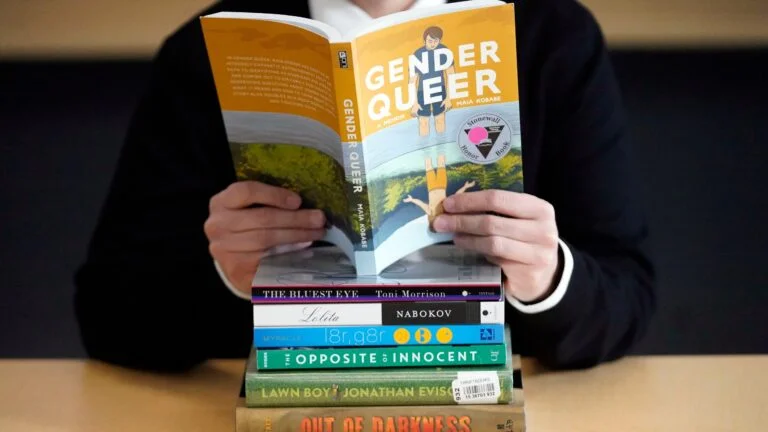Introduction: An Ongoing Battle Over Representation in Education
An Ohio elementary school teacher, Karen Cahall, has taken legal action against her school district after facing disciplinary measures for including LGBTQ-themed books in her classroom library. The lawsuit, filed in federal court, questions the constitutionality of the school district’s policies and highlights the growing tension surrounding LGBTQ representation in schools.

Cahall, a veteran educator at Monroe Elementary School in the New Richmond Exempted Village School District, asserts that her moral and religious beliefs affirm the importance of respecting all children, including those identifying as LGBTQ or belonging to LGBTQ families. This article delves into the case’s background, the legal challenges, and its broader implications for educational freedom and inclusivity.
Background: Who is Karen Cahall?
Karen Cahall has dedicated over 30 years to teaching in the New Richmond Exempted Village School District, building a reputation as a compassionate and committed educator. Known for fostering inclusivity, her decision to include books with LGBTQ characters reflects her deeply held belief in creating a welcoming environment for all students.
However, the inclusion of four specific books in her classroom library has drawn criticism, resulting in her suspension. These books were neither mandatory reading nor prominently displayed but were among 100 other titles available for students to explore.
The Books in Question: Representation Without Explicit Content
The four books at the center of the controversy are:
- Ana on the Edge by A.J. Sass
- The Fabulous Zed Watson by Basil Sylvester
- Hazel Bly and the Deep Blue Sea by Ashley Herring Blake
- Too Bright to See by Kyle Lukoff
Each book features LGBTQ characters navigating themes of identity, acceptance, and belonging. Importantly, none of these books contain explicit content or sexual activity, as noted in the lawsuit. Instead, they focus on characters coming to terms with feelings of difference and exclusion—universal experiences that resonate with many students.
The Controversial Policy: Balancing Open-Mindedness and Censorship
The New Richmond Exempted Village School District adopted a policy in 2009 to address controversial issues. According to the policy, topics likely to spark community debate can be taught if they align with instructional goals, promote open-mindedness, and avoid indoctrination. Materials outside the standard curriculum must receive principal approval.
Cahall’s lawsuit argues that this policy is overly restrictive and was unjustly applied in her case. She contends that her suspension for bypassing the approval process undermines her ability to provide a diverse and inclusive classroom environment.
The Discipline: Superintendent’s Response
Superintendent Tracey Miller issued a disciplinary letter stating that Cahall’s actions were intentional, as she had previously requested the books be added to the school library but was denied. Despite this, Cahall placed them in her classroom library. Miller suspended her for three days without pay and warned that further similar actions could lead to termination.
The lawsuit accuses the superintendent of reacting disproportionately and claims the policy was selectively enforced to target LGBTQ-related content.
Legal Implications: A Battle Over Constitutional Rights
Cahall’s lawsuit raises questions about the intersection of educational policies and constitutional rights. Specifically, it challenges:
- Freedom of Speech: Whether the policy infringes on teachers’ ability to provide diverse educational resources.
- Equal Protection: Whether LGBTQ-related content is being unfairly singled out for censorship.
- Religious Beliefs: Cahall asserts that her actions align with her deeply rooted moral and religious convictions, which advocate for the respect and inclusion of all children.
The outcome of this case could set a precedent for how schools across the country handle diverse content in classrooms.
Community Reaction: Divided Opinions
The case has sparked mixed reactions within the community. While some parents, like Kayla Shaw, have expressed concerns about the appropriateness of LGBTQ books for young children, others argue that excluding such content marginalizes LGBTQ students and families. The debate underscores the broader cultural conflict over representation in educational spaces.
The Broader Context: Banned Books in America
This case is part of a larger trend of challenges to books addressing race, gender, and sexuality in schools. According to the American Library Association, LGBTQ-themed books are among the most frequently challenged titles in the U.S. These challenges often spark debates about parental rights, academic freedom, and the role of public schools in fostering inclusivity.
FAQs
1. Why was Karen Cahall suspended?
Cahall was suspended for including LGBTQ-themed books in her classroom library without receiving prior approval, as required by the school district’s policy on controversial topics.
2. What are the books involved in this case?
The books are Ana on the Edge, The Fabulous Zed Watson, Hazel Bly and the Deep Blue Sea, and Too Bright to See. These titles feature LGBTQ characters but contain no explicit content.
3. What does the school district’s policy state about controversial topics?
The policy allows controversial topics to be addressed if they align with instructional goals, promote open-mindedness, and avoid persuading students toward a particular viewpoint. Materials outside the curriculum require principal approval.
4. What are the broader implications of this case?
The lawsuit could influence how schools across the U.S. handle diverse content in classrooms and the enforcement of policies on controversial topics.
5. How does this case relate to the broader trend of book bans?
This case is part of a nationwide debate over books addressing race, gender, and sexuality, with LGBTQ-themed books often at the center of challenges and bans.
Conclusion: What’s at Stake?
Cahall’s lawsuit represents more than a dispute over disciplinary action; it embodies the ongoing struggle to balance inclusivity, academic freedom, and community standards in education. As the legal battle unfolds, it will likely influence policies on controversial topics in schools, shaping the future of diverse representation in educational materials.




